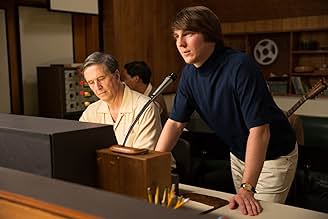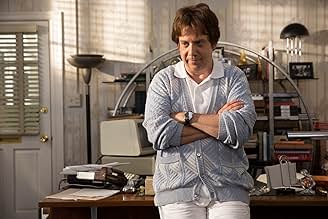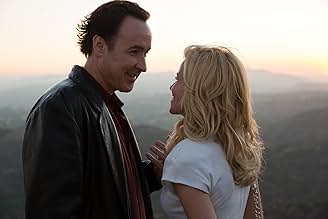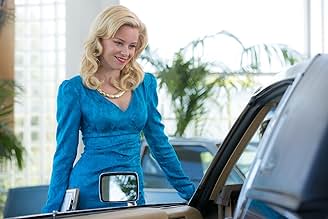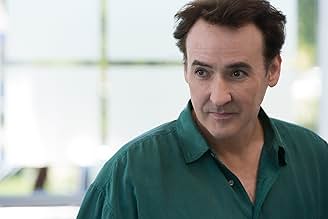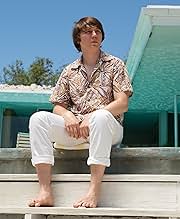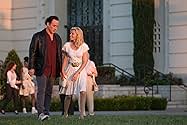A partir de los años 60, seguimos al líder de los Beach Boys, Brian Wilson, y su lucha contra la psicosis mientras intenta crear una obra maestra del pop de vanguardia.A partir de los años 60, seguimos al líder de los Beach Boys, Brian Wilson, y su lucha contra la psicosis mientras intenta crear una obra maestra del pop de vanguardia.A partir de los años 60, seguimos al líder de los Beach Boys, Brian Wilson, y su lucha contra la psicosis mientras intenta crear una obra maestra del pop de vanguardia.
- Dirección
- Guionistas
- Elenco
- Premios
- 20 premios ganados y 58 nominaciones en total
- Dirección
- Guionistas
- Todo el elenco y el equipo
- Producción, taquilla y más en IMDbPro
Opiniones destacadas
It's no secret that with the plethora of biopics we get every year, there is a formula that many of them follow. Just last year, we got to see the stories of a wayward soul who ventured out on a soul-cleansing journey through the mountains, a computer genius who cracked a presumably unbreakable code during war times, one of the deadliest snipers in American history, and one of funk's greatest musicians told on film. Bill Pohland's "Love & Mercy," concerning the life of Beach Boys singer Brian Wilson, is bound to be written off by some as another interchangeable biopic, but if you've seen so much as a trailer for this film, you know this is something deeper, richer, and more complex than formula could ever begin to handle.
"Love & Mercy" focuses on two times pieced together, as Pohland and the writing team of Michael Alan Lerner and Oren Moverman segway between the "past" Brian Wilson, played by Paul Dano, and the "future" Brian Wilson, played by John Cusack, never telling us exactly where the present lies. We follow Wilson during his rise with his brothers and friends to make The Beach Boys one of America's most successful boy bands in the 1960's. Despite initial success with The Beach Boys, following a severe panic attack, Wilson resigns from the band to focus on writing back home in California. He's convinced he has found the formula for "the greatest rock album ever," experimenting with a plethora of different melodies, instruments, and lyrics to create something one can not only hear and enjoy, but feel.
While undergoing this arduous process, Wilson is met with little vocal support. He receives the casual head nods from most of his bandmates, with the exception of Michael Love (Jake Abel), who constantly criticizes his creative decisions, and his father, who is still bitter after being fired by his own son. While focusing on this, we frequently jump into Brian's life in the future, where he is placed under the care of Dr. Eugene Landy (Paul Giamatti in another brutal but compelling role), who over-medicates and physically and mentally abuses him. Brian winds up meeting and falling for a Cadillac saleswoman named Melinda Ledbetter (Elizabeth Banks), who constantly wants to be with him but finds Dr. Landy to be a smothering force preventing their connection from growing.
Pohland's experimental structure for "Love & Mercy" is nothing shy of remarkable, but the fact that it doesn't make the film feel off balance or tonally uneven is a total cinematic anomaly. While frequently weaving through different time periods seems ripe for complete chaos for a film trying to keep a consistent tone, "Love & Mercy" handles the challenge beautifully, humanizing Brian regardless of his age and working to find the core idea in each scene.
I've long asserted that Paul Dano is one of the finest actors in cinema today and "Love & Mercy" is another link in his ever-growing chain of terrific performances. Similar to his role in "Prisoners," Dano must remain relatively expressionless and look as if nothing is occurring inside his head, when really, there is too much going on in his head to accurately communicate. Dano, once again, blindsides the audience by taking a role that seems too facile to carry a film and making it a fleshed out, thoroughly impressive performance. John Cusack also delivers a role much like Dano, channeling his kind of emptiness so well that it's like watching two actors in different time periods of their life playing a character in different time periods of his own life. The result is a mesmerizing, surreal experience.
"Love & Mercy"'s vignette-style structure examines the heartbreak, the joy, the contentment, and the unmatched physical and mental pressure of Brian in a remarkably tender way. Robert Yeoman's cinematography also paints a picture that, while littered with nostalgia in look, costume design, and general vibes, captures Brian's hectic environment so affectionately that it becomes strangely beautiful. Through all of Brian's madness, his unpredictable panic attacks, episodes of rage, and the contemptuous relationship with his father, Pohland searches to find attributes of Brian to showcase in a way that's impacting.
Calling "Love & Mercy" a "mesmerizing, surreal experience" is an appropriate, if ostensibly exaggerating, summation. Similar to how Brian can't always communicate the beauty behind the sound of his music, I can't quite put my finger on what works with this film and in what manner. This film, however, snuck up on me in a way that was remarkably subtle but lasting and, even though it's been several days since I've seen it, the effect remains strong in a way that only enhances the film's compelling and unique aura.
"Love & Mercy" focuses on two times pieced together, as Pohland and the writing team of Michael Alan Lerner and Oren Moverman segway between the "past" Brian Wilson, played by Paul Dano, and the "future" Brian Wilson, played by John Cusack, never telling us exactly where the present lies. We follow Wilson during his rise with his brothers and friends to make The Beach Boys one of America's most successful boy bands in the 1960's. Despite initial success with The Beach Boys, following a severe panic attack, Wilson resigns from the band to focus on writing back home in California. He's convinced he has found the formula for "the greatest rock album ever," experimenting with a plethora of different melodies, instruments, and lyrics to create something one can not only hear and enjoy, but feel.
While undergoing this arduous process, Wilson is met with little vocal support. He receives the casual head nods from most of his bandmates, with the exception of Michael Love (Jake Abel), who constantly criticizes his creative decisions, and his father, who is still bitter after being fired by his own son. While focusing on this, we frequently jump into Brian's life in the future, where he is placed under the care of Dr. Eugene Landy (Paul Giamatti in another brutal but compelling role), who over-medicates and physically and mentally abuses him. Brian winds up meeting and falling for a Cadillac saleswoman named Melinda Ledbetter (Elizabeth Banks), who constantly wants to be with him but finds Dr. Landy to be a smothering force preventing their connection from growing.
Pohland's experimental structure for "Love & Mercy" is nothing shy of remarkable, but the fact that it doesn't make the film feel off balance or tonally uneven is a total cinematic anomaly. While frequently weaving through different time periods seems ripe for complete chaos for a film trying to keep a consistent tone, "Love & Mercy" handles the challenge beautifully, humanizing Brian regardless of his age and working to find the core idea in each scene.
I've long asserted that Paul Dano is one of the finest actors in cinema today and "Love & Mercy" is another link in his ever-growing chain of terrific performances. Similar to his role in "Prisoners," Dano must remain relatively expressionless and look as if nothing is occurring inside his head, when really, there is too much going on in his head to accurately communicate. Dano, once again, blindsides the audience by taking a role that seems too facile to carry a film and making it a fleshed out, thoroughly impressive performance. John Cusack also delivers a role much like Dano, channeling his kind of emptiness so well that it's like watching two actors in different time periods of their life playing a character in different time periods of his own life. The result is a mesmerizing, surreal experience.
"Love & Mercy"'s vignette-style structure examines the heartbreak, the joy, the contentment, and the unmatched physical and mental pressure of Brian in a remarkably tender way. Robert Yeoman's cinematography also paints a picture that, while littered with nostalgia in look, costume design, and general vibes, captures Brian's hectic environment so affectionately that it becomes strangely beautiful. Through all of Brian's madness, his unpredictable panic attacks, episodes of rage, and the contemptuous relationship with his father, Pohland searches to find attributes of Brian to showcase in a way that's impacting.
Calling "Love & Mercy" a "mesmerizing, surreal experience" is an appropriate, if ostensibly exaggerating, summation. Similar to how Brian can't always communicate the beauty behind the sound of his music, I can't quite put my finger on what works with this film and in what manner. This film, however, snuck up on me in a way that was remarkably subtle but lasting and, even though it's been several days since I've seen it, the effect remains strong in a way that only enhances the film's compelling and unique aura.
An interesting look at Brian Wilson, but it pretty much ignores his brothers. It's focused on him because his wife only knew the older Brian, and in spite of a decent piece of time shifting, it shrinks the story down. Both Dano and Cusack are great. Giamatti is.. Giamatti.
What we need is a TV series because there is so much missing here. Manson, Dennis's death, the drugs, Reagan. They could also do one on Landy: shrink to the stars.
What we need is a TV series because there is so much missing here. Manson, Dennis's death, the drugs, Reagan. They could also do one on Landy: shrink to the stars.
While I generally enjoy most music biopics, it's hard to argue with the fact that most of them tend to subscribe to a very familiar pattern. Every once in awhile, a film comes along that break the mold - Todd Haynes did it in 2007 with I'm Not There, which featured six different actors portraying Bob Dylan at various points in his career. That film's writer, Oren Moverman, offers a similarly unconventional approach to Love & Mercy, which hones in on two critical periods during the life of Beach Boys songwriter Brian Wilson.
We first encounter Brian (Paul Dano) during the 1960s, shortly before the band is scheduled to head out for a tour of Japan. Reluctant to return to the road, Brian convinces his brothers that he belongs at home in the studio, where he'll be more effective at creating the band's next album. The boys finally acquiesce, and Brian hires a collection of studio musicians to begin crafting what would ultimately become Pet Sounds.
Our next encounter with Brian comes during the 1980s, where he's portrayed by John Cusack. Brian meets, and attempts to court, Cadillac saleswoman Melinda Ledbetter (Elizabeth Banks), but she quickly discovers that Brian's life is not his own when she meets Dr. Eugene Landy (Paul Giamatti), his therapist and legal guardian. Landy controls every aspect of Brian's existence, from his diet to his personal relationships, all the while insisting that he has Brian's best interests at heart.
The film frequently cuts between these two periods in Brian's life. We see the depths of his imagination and creativity as he employs a range of nontraditional elements to record Pet Sounds, desperately trying to bring to life the music he hears in his head, and all the while sliding further and further into the grip of severe mental illness. And we see the results of that illness, as Brian becomes a timid, broken man, cut off from his friends and family, allowing himself to be controlled and manipulated, and never able to find peace.
Director Bill Pohlad does a marvelous job of illustrating the parallels between each on screen version of Brian Wilson, and both actors give brilliant, emotional performances. Dano in particular turns in what can arguably be called the best work of his career, perfectly embodying Brian's childlike glee as he excitedly flits around the studio, and capturing the anguish and desperation as his mind continues to deteriorate.
Unorthodox in its approach and admirable in its complexity, Love & Mercy wisely chooses not to paint a definitive portrait of a man whose life couldn't possibly be summed up in a two-hour film. By confining the narrative to these two specific chapters, we're able to go far beyond the surface and reveal the inner workings of a tortured genius, and shed light on a story that few people are familiar with. Love & Mercy is a truly exceptional film about the internal and external struggles of a truly exceptional person, and is one of the most emotionally resonant experiences I've had with a film this year.
We first encounter Brian (Paul Dano) during the 1960s, shortly before the band is scheduled to head out for a tour of Japan. Reluctant to return to the road, Brian convinces his brothers that he belongs at home in the studio, where he'll be more effective at creating the band's next album. The boys finally acquiesce, and Brian hires a collection of studio musicians to begin crafting what would ultimately become Pet Sounds.
Our next encounter with Brian comes during the 1980s, where he's portrayed by John Cusack. Brian meets, and attempts to court, Cadillac saleswoman Melinda Ledbetter (Elizabeth Banks), but she quickly discovers that Brian's life is not his own when she meets Dr. Eugene Landy (Paul Giamatti), his therapist and legal guardian. Landy controls every aspect of Brian's existence, from his diet to his personal relationships, all the while insisting that he has Brian's best interests at heart.
The film frequently cuts between these two periods in Brian's life. We see the depths of his imagination and creativity as he employs a range of nontraditional elements to record Pet Sounds, desperately trying to bring to life the music he hears in his head, and all the while sliding further and further into the grip of severe mental illness. And we see the results of that illness, as Brian becomes a timid, broken man, cut off from his friends and family, allowing himself to be controlled and manipulated, and never able to find peace.
Director Bill Pohlad does a marvelous job of illustrating the parallels between each on screen version of Brian Wilson, and both actors give brilliant, emotional performances. Dano in particular turns in what can arguably be called the best work of his career, perfectly embodying Brian's childlike glee as he excitedly flits around the studio, and capturing the anguish and desperation as his mind continues to deteriorate.
Unorthodox in its approach and admirable in its complexity, Love & Mercy wisely chooses not to paint a definitive portrait of a man whose life couldn't possibly be summed up in a two-hour film. By confining the narrative to these two specific chapters, we're able to go far beyond the surface and reveal the inner workings of a tortured genius, and shed light on a story that few people are familiar with. Love & Mercy is a truly exceptional film about the internal and external struggles of a truly exceptional person, and is one of the most emotionally resonant experiences I've had with a film this year.
This is the story of Brian Wilson during two time periods. In 1964, Brian Wilson (Paul Dano) has a panic attack and quits touring with the band. Instead he concentrates on writing for the new record Pet Sounds. He struggles from his abusive father and starts hearing voices. In the 80s, Brian (John Cusack) is under the control of his therapist Dr. Eugene Landy (Paul Giamatti). He buys a car from saleswoman Melinda Ledbetter (Elizabeth Banks) who eventually breaks Landy's hold on him.
This is a compelling biopic of an interesting person. Paul Dano really hits it out of the park. His section has some great scenes. On its own, John Cusack does a great job. Put together, I can't help but think that Cusack is doing a passable imitation of Dano's performance. I'm not judging their relative acting skills. I just think that Dano has always played this type of character and he simply fits better. I'm certain that Dano would be nominated for an Oscar if he played both time periods. Landy is the villain of the piece and Giamatti plays him with gusto. For a more nuanced character, the movie needs to show his character saving Brian at the beginning. Splitting the time period so neatly does lessen some important sections of Brian's life.
This is a compelling biopic of an interesting person. Paul Dano really hits it out of the park. His section has some great scenes. On its own, John Cusack does a great job. Put together, I can't help but think that Cusack is doing a passable imitation of Dano's performance. I'm not judging their relative acting skills. I just think that Dano has always played this type of character and he simply fits better. I'm certain that Dano would be nominated for an Oscar if he played both time periods. Landy is the villain of the piece and Giamatti plays him with gusto. For a more nuanced character, the movie needs to show his character saving Brian at the beginning. Splitting the time period so neatly does lessen some important sections of Brian's life.
Anyone who knows me knows my favorite band is The Beach Boys, and my favorite musician is their leader, Brian Wilson. I first got deep into their music last November when I heard their album SMiLE, an album which wasn't officially released until 45 years after its conception and recording. It was worth the wait, as I consider it the best album I've ever heard.
I found out that a biopic of Wilson was in the works, and would be screening at SXSW with Wilson in attendance. I knew I had to go and see this film. The experience is one that will stick with me for the rest of my life as one of the most emotionally powerful events I have been a part of.
Love and Mercy is the story of The Beach Boys' founder Brian Wilson. The film chronicles his rise to fame in the 1960's and the his decline into mental illness, and his escape from the control of his therapist in the 1980's.
Paul Dano plays Wilson in the 1960's, and John Cusack plays him in the 1980's. It also stars Elizabeth Banks as Wilson's future wife, Melinda Ledbetter, and Paul Giamatti as his therapist, Eugene Landy.
Paul Dano exudes the boyish look of young Wilson perfectly. He relearned how to play piano for the role, and sings much of the music in the film.
His performance is hard to watch at times because of how depressing it is seeing him devolve from an energetic, fun young man into a tortured, drained artist. Dano handles the role with passion and care, and his performance never feels forced or fake.
When Wilson begins to suffer a panic attack, anyone who's had one will feel deeply for him. When he starts to have physical symptoms of depression after years of physical and mental abuse from his father and disapproval of his musical direction from fellow band mate Mike Love, Dano portrays the hurt that comes from those events with subtle facial expressions and natural transition.
John Cusack looks less like Wilson physically, but his performance may be even more complex. His Wilson has been to the bottom, and he brilliantly portrays how challenging it is to rebuild your life after going through mental and physical anguish.
Elizabeth Banks has a great departure from her more well known comedic film roles, and as Ledbetter, she shows her strength and respect for the man she loves through actions and subtle expressions instead of overt, over the top dialog.
Paul Giamatti has the most campy role in the film as Eugene Landy, but this is unfortunately how Landy was in real life. He was as violent and controlling over Wilson's life as the movie portrays, so his abusive, manipulative, angering performance is highly accurate.
One of the best things about Love and Mercy is that it doesn't exaggerate or make up events to make the film more interesting. The filmmakers trust the strength of its source material is interesting enough to make for a great story.
The storytelling structure of the movie is interesting and risky. The film jumps from the 60's to the 80's without warning, and it works. The slightly askew technique allows the audience to experience the downfall and uprising of Wilson's life simultaneously, and allows the movie to end on a happy note.
One complaint people have is that the film skips over the 1970's, Wilson's most tumultuous period in which he weighed 300 pounds and spent the majority of three years in bed, crippled by depression and drug addiction. However, this allows the audience to examine the reasons for his downfall and redemption instead of indulging in the horrible escapism Wilson turned to.
Beach Boys fans will appreciate the movie more than the average film-goer. Mike Love in hats, dancing, and mentioning "the formula"? Check. Drug tent and piano in the sandbox in Wilson's living room? Check. The infamous "Fire" session? Check. Everything is on point, from the scarily accurate wardrobe down to recreating the "Sloop John B." and "Surf's Up" promo videos shot for shot. It's these moments that show the film was made by fans with an attention for detail.
Almost every song on the album Pet Sounds is featured in the film somewhere. Seeing Wilson's unorthodox recording techniques is such a pleasure for music nerds.
Cinematographer Robert Yeoman, best known for creating the look of Wes Anderson's films, blends stylistic tone with realistic camera work, creating a sense of false nostalgia that is surreal yet inviting and intense.
Composer Atticus Ross works wonders with the score, using a great wealth of Wilson's music in different ways and choosing songs that fit with the emotional tone of the scene brilliantly. Hearing the instrumental version of "Don't Talk" play as Wilson takes LSD for the first time is haunting. Witnessing the song "Til' I Die" play over a surreal, Kubrickian scene in which Wilson has an epiphany made me cry because of the powerful combination of imagery and music.
The film is being released on June 5, to capitalize on The Beach Boys music being a staple of the summer, but it feels more like a Thanksgiving release to me. The cinematography, acting, script, and score are all Oscar worthy in my opinion, but the film may get lost in the race to other contenders, which is a shame.
Love and Mercy is an awesome, unorthodox biopic that takes risks with form and narrative that has strong performances, script, cinematography, and of course, an amazing soundtrack. It will expose young people to the brilliance of Wilson's music and give older fans an insight into why Wilson is the poster boy for using creativity as an escape and an outlet from the pain of life and mental illness.
And seriously, listen to the album SMiLE.
I found out that a biopic of Wilson was in the works, and would be screening at SXSW with Wilson in attendance. I knew I had to go and see this film. The experience is one that will stick with me for the rest of my life as one of the most emotionally powerful events I have been a part of.
Love and Mercy is the story of The Beach Boys' founder Brian Wilson. The film chronicles his rise to fame in the 1960's and the his decline into mental illness, and his escape from the control of his therapist in the 1980's.
Paul Dano plays Wilson in the 1960's, and John Cusack plays him in the 1980's. It also stars Elizabeth Banks as Wilson's future wife, Melinda Ledbetter, and Paul Giamatti as his therapist, Eugene Landy.
Paul Dano exudes the boyish look of young Wilson perfectly. He relearned how to play piano for the role, and sings much of the music in the film.
His performance is hard to watch at times because of how depressing it is seeing him devolve from an energetic, fun young man into a tortured, drained artist. Dano handles the role with passion and care, and his performance never feels forced or fake.
When Wilson begins to suffer a panic attack, anyone who's had one will feel deeply for him. When he starts to have physical symptoms of depression after years of physical and mental abuse from his father and disapproval of his musical direction from fellow band mate Mike Love, Dano portrays the hurt that comes from those events with subtle facial expressions and natural transition.
John Cusack looks less like Wilson physically, but his performance may be even more complex. His Wilson has been to the bottom, and he brilliantly portrays how challenging it is to rebuild your life after going through mental and physical anguish.
Elizabeth Banks has a great departure from her more well known comedic film roles, and as Ledbetter, she shows her strength and respect for the man she loves through actions and subtle expressions instead of overt, over the top dialog.
Paul Giamatti has the most campy role in the film as Eugene Landy, but this is unfortunately how Landy was in real life. He was as violent and controlling over Wilson's life as the movie portrays, so his abusive, manipulative, angering performance is highly accurate.
One of the best things about Love and Mercy is that it doesn't exaggerate or make up events to make the film more interesting. The filmmakers trust the strength of its source material is interesting enough to make for a great story.
The storytelling structure of the movie is interesting and risky. The film jumps from the 60's to the 80's without warning, and it works. The slightly askew technique allows the audience to experience the downfall and uprising of Wilson's life simultaneously, and allows the movie to end on a happy note.
One complaint people have is that the film skips over the 1970's, Wilson's most tumultuous period in which he weighed 300 pounds and spent the majority of three years in bed, crippled by depression and drug addiction. However, this allows the audience to examine the reasons for his downfall and redemption instead of indulging in the horrible escapism Wilson turned to.
Beach Boys fans will appreciate the movie more than the average film-goer. Mike Love in hats, dancing, and mentioning "the formula"? Check. Drug tent and piano in the sandbox in Wilson's living room? Check. The infamous "Fire" session? Check. Everything is on point, from the scarily accurate wardrobe down to recreating the "Sloop John B." and "Surf's Up" promo videos shot for shot. It's these moments that show the film was made by fans with an attention for detail.
Almost every song on the album Pet Sounds is featured in the film somewhere. Seeing Wilson's unorthodox recording techniques is such a pleasure for music nerds.
Cinematographer Robert Yeoman, best known for creating the look of Wes Anderson's films, blends stylistic tone with realistic camera work, creating a sense of false nostalgia that is surreal yet inviting and intense.
Composer Atticus Ross works wonders with the score, using a great wealth of Wilson's music in different ways and choosing songs that fit with the emotional tone of the scene brilliantly. Hearing the instrumental version of "Don't Talk" play as Wilson takes LSD for the first time is haunting. Witnessing the song "Til' I Die" play over a surreal, Kubrickian scene in which Wilson has an epiphany made me cry because of the powerful combination of imagery and music.
The film is being released on June 5, to capitalize on The Beach Boys music being a staple of the summer, but it feels more like a Thanksgiving release to me. The cinematography, acting, script, and score are all Oscar worthy in my opinion, but the film may get lost in the race to other contenders, which is a shame.
Love and Mercy is an awesome, unorthodox biopic that takes risks with form and narrative that has strong performances, script, cinematography, and of course, an amazing soundtrack. It will expose young people to the brilliance of Wilson's music and give older fans an insight into why Wilson is the poster boy for using creativity as an escape and an outlet from the pain of life and mental illness.
And seriously, listen to the album SMiLE.
¿Sabías que…?
- TriviaThe real Wilson reported having a mild dissociative experience while watching the film. He started to believe that Paul Giamatti was the actual Eugene Landy and felt "absolutely in fear" for several minutes.
- ErroresContrary to what is shown, the recording for "Good Vibrations" began during the making of "Pet Sounds", not after.
- Citas
Brian Future: I want you to leave, but I don't want you to leave me.
- Créditos curiososFirst, there's concert footage of the recent Brian Wilson, himself, singing "Love & Mercy", and then at the very end there is audio of a brief recreated studio recording of Good Vibrations, with '60s Brian leading the dialogue.
- Versiones alternativasThe version which premiered at the 2014 Toronto Film Festival and a few subsequent public screenings contained a few extra scenes, such as an "I Get Around" studio sequence, and a scene where Wilson meets Phil Spector on the street. The closing song "One Kind of Love" was also absent from this cut.
- Bandas sonorasSurfin' U.S.A.
Written by Chuck Berry
Lyrics by Brian Wilson (uncredited)
Performed by The Beach Boys
Courtesy of Capitol Records
Under license from Universal Music Enterprises
Selecciones populares
Inicia sesión para calificar y agrega a la lista de videos para obtener recomendaciones personalizadas
- How long is Love & Mercy?Con tecnología de Alexa
Detalles
- Fecha de lanzamiento
- País de origen
- Sitios oficiales
- Idioma
- También se conoce como
- Love & Mercy
- Locaciones de filmación
- Productoras
- Ver más créditos de la compañía en IMDbPro
Taquilla
- Presupuesto
- USD 10,000,000 (estimado)
- Total en EE. UU. y Canadá
- USD 12,551,031
- Fin de semana de estreno en EE. UU. y Canadá
- USD 2,122,177
- 7 jun 2015
- Total a nivel mundial
- USD 28,641,776
- Tiempo de ejecución2 horas 1 minuto
- Color
- Mezcla de sonido
- Relación de aspecto
- 1.85 : 1
Contribuir a esta página
Sugiere una edición o agrega el contenido que falta

Principales brechas de datos
By what name was Amor y Compasión (2014) officially released in India in English?
Responda






